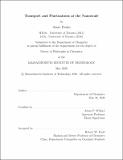Transport and fluctuations at the nanoscale
Author(s)
Dodin, Amro.
Download1192960068-MIT.pdf (15.89Mb)
Other Contributors
Massachusetts Institute of Technology. Department of Chemistry.
Advisor
Adam P. Willard.
Terms of use
Metadata
Show full item recordAbstract
Nonequilibrium nanoscale systems present a range of fundamental and technological questions that microscopic theories based on Newton's and Schrödinger's equations as well as coarse grained macroscopic theories like thermodynamics are ill-equipped to handle. These systems are typically comprised of too many degrees of freedom to permit a microscopic treatment but show significant fluctuations or dependence on molecular detail that prohibit macroscopic coarse graining, thereby requiring the development of new theoretical and computational tools. This thesis considers two complementary approaches to treating mesoscale systems. In the first part, a range of numerical Monte-Carlo models are developed for treating energy and charge transport in disordered nanostructured semiconductors. These studies reveal surprising non-equilibrium effects such as transport enhanced dye-sensitization in molecular aggregate-quantum dot colloids and nonequilibrium exciton "heating" in ligand exchanged quantum dot films that can be engineered to enhance macroscopic device performance. In addition, I present a model for electron transport through quantum dot solids that is used to derive quantitative design principles for electron energy filtering materials that can be used to mitigate thermal broadening in electronic devices. In the second part, I present a new formalism for treating heterogeneity in quantum ensembles that can be applied to emerging single molecule quantum spectroscopies. The resulting state space distribution formulation shares several important properties with classical phase space distribution, allowing for novel generalizations of classical statistical mechanical results. I show that this isomorphism can be used to systematically generalize the Crooks Fluctuation Theorem, Jarzynski Non-equilbirum Work Relation and the Bochkov-Kuzovlev generating functional that compactly encodes the Jarzynski equality, Onsager reciprocity relations and nonlinear response of all orders. The ability to generate these generalizations shows that despite very different mathematical manifestations in traditional theories, the fluctuations characterized by these theorems arise from the same fundamental physics in both quantum and classical systems.
Description
Thesis: Ph. D., Massachusetts Institute of Technology, Department of Chemistry, May, 2020 Cataloged from the official PDF of thesis. Includes bibliographical references (pages 185-203).
Date issued
2020Department
Massachusetts Institute of Technology. Department of ChemistryPublisher
Massachusetts Institute of Technology
Keywords
Chemistry.